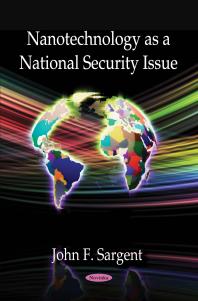(Ebook) Nanotechnology as a National Security Issue by John F. Sargent ISBN 9781614703365, 1614703361
The projected economic and societal benefits of nanotechnology have propelled global investments by nations and companies. The United States launched the first national nanotechnology initiative in 2000. Since then, more than 60 nations have launched similar initiatives. In 2006, global public investment in nanotechnology was estimated to be $6.4 billion, with an additional $6.0 billion provided by the private sector. More than 600 nanotechnology products are now in the market, generally offering incremental improvements over existing products. However, proponents maintain that nanotechnology research and development currently underway could offer revolutionary applications with significant implications for the U.S. economy, national and homeland security, and societal well-being. These investments, coupled with nanotechnology’s potential implications, have raised interest and concerns about the U.S. competitive position. The data used to assess competitiveness in mature technologies and industries, such as revenues and market share, are not available for assessing nanotechnology. In fact, the U.S. government does not currently collect such data for nanotechnology, nor is comparable international data available. Without this information, an authoritative assessment of the U.S. competitive position is not possible. Alternatively, indicators of U.S. scientific and technological strength (e.g., public and private research investments, nanotechnology papers published in scientific journals, patents) may provide insight into the current U.S. position and serve as bellwethers of future competitiveness. By these criteria, the United States appears to be the overall global leader in nanotechnology. However, other nations are investing heavily and may lead in specific areas of nanotechnology. Some believe the U.S. leadership position in nanotechnology may not be as large as it has been in previous emerging technologies. Efforts to develop and commercialize nanotechnology face a variety of challenges — e.g., technical hurdles; availability of capital; environmental, health, and safety concerns; and immature manufacturing technology and infrastructure. Some advocate a more active federal government role in overcoming these challenges, including funding to aid in the translation of research to commercial products; general and targeted tax provisions; incentives for capital formation; increased support for development of manufacturing and testing infrastructure, standards and nomenclature development, and education and training; creation of science, technology, and innovation parks; and efforts to establish a stable and predictable regulatory environment that keeps pace with innovation. Some support a more limited federal role. Some who hold this view maintain that the market, free from government interventions, is most efficient. They assert that federal efforts can create market distortions and result in the federal government picking “winners and losers” among technologies, companies, and industries. Others oppose federal support for industrial research and applications, labeling such efforts “corporate welfare.” Still others argue for a moratorium on nanotechnology R&D until environmental, health, and safety concerns are addressed.
*Free conversion of into popular formats such as PDF, DOCX, DOC, AZW, EPUB, and MOBI after payment.


